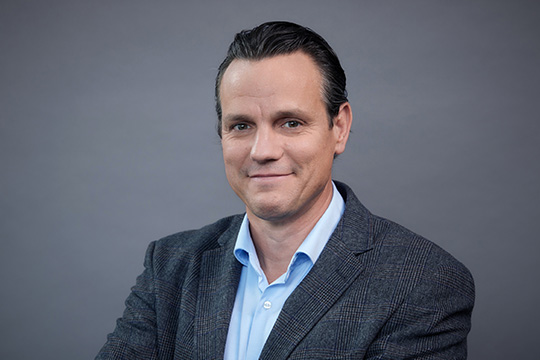Technological progress, digitalisation and innovations are mandatory in global competition. The free skate consists of sustainable efforts. Despite the impressive signals of climate change, too few companies are taking a long-term approach to surviving in the future world. Felix Sühlmann-Faul, freelance sociologist of technology and author, gets to the bottom of questions about this interplay together with Detecon's Managing Partner Steffen Roos.
Detecon: As a sociologist of technology, you deal with the topics of sustainability and digitalisation. Sociologists are known to be world champions of definition. How do you define these two terms for yourself?
Felix Sühlmann-Faul: When it comes to sustainability, it makes sense to draw on the 'cradle' of the United Nations' 17 Sustainable Development Goals. These originate in the well-known and still popular definition of the Norwegian politician Gro Harlem Brundtland, who wrote in her report "Our Common Future" in 1987: "Sustainable development is development that meets the needs of the present without compromising the ability of future generations to meet their own needs.
Furthermore, the term is understood with a simultaneity of economic, environmental and social dimensions. Thus, in order to achieve sustainability, attention must be paid to these three levels. The term can also be explained somewhat more abstractly by means of efficiency, consistency and sufficiency:
- Efficiency: for example, using less energy to produce the same amount of a product.
- Consistency: reusing existing material in another form - recycling also falls under this.
- Sufficiency: general reduction - less energy consumption, consumption, lifestyle.
Sufficiency is the most important component of these three. Efficiency and consistency are important, but they do not have the scope and effectiveness that sufficiency has, and sustainability stands and falls with them. In a scientific paper, I defined digitalisation as follows:
"Digitisation is the overall societal, global, socio-technical transformation through an exponentially growing performance of microelectronics."
This definition is somewhat unwieldy, but it has several advantages:
- It excludes the more concrete, earlier offshoots of digitalisation.
- The process that was triggered by the third industrial revolution and is still ongoing is covered.
- It addresses one of the most important characteristics of digitalisation: It is a socio-technical revolution. This means that it is a process that influences all levels of society to a greater or lesser extent and the process itself is also influenced by society.
In your publications, you speak of a "blind spot in digitalisation". What do you mean by that?
In short, the blind spot consists of the misunderstanding that the use of digitalisation in any way 'automatically' generates sustainability or is sustainable. The speed of innovation leaps is immense, especially in the age of digitalisation. This also increases the complexity - especially when considering topics such as quantum computing, AI and CRISPR. These are reported on daily in the media. But who is able to explain them? Very few. And by not understanding, but seeing that a technological artefact nevertheless works, the turn to science and rationality that the Enlightenment era brought us has effectively taken a hundred and eighty degree turn. Perhaps as a result, we believe more every day as we understand less.
Questions about ecological and social damage as consequences of digital infrastructures, server farms and smartphones can often fall by the wayside. And thus a public discourse on sustainability issues of technology in general and digitalisation in particular is mostly absent.
In digitalisation, arguments are often made about economy of scale and network effects, which imply exponential growth in use, for example. How do you see this growth paradigm?
This is a very difficult and problematic issue. When we talk about economic growth, essential institutions of our society depend on the existence of constant growth: Social security or pensions, for example. At the same time, we have known at least since the publications of the Club Of Rome in the early 1970s that infinite growth on a biophysically finite planet is the exact opposite of sustainability. The consequences are environmental consumption and a high degree of injustice between the global North and South and towards our future generations.
The mentioned form of growth in numbers of users is also problematic in that it brings to the fore one of the major systemic flaws of the capitalist principle: Accumulation and, as a consequence, the formation of monopolies. The network effect leads to the fact that when choosing messenger services or social networks, the already 'big' ones are favoured. Who would use a messenger that few of their friends and acquaintances use?
If we take the example of the Google search engine, which has a market share of around 90 per cent in Europe, the fact that many people use it makes it better. The algorithm becomes more accurate and thus the benefits of using it increase, which in turn leads more users to prefer the search engine. This is of short-term benefit to users. In the longer term, however, there is an increased dependence on a technical tool that is maintained by private economic interests.
Manipulation of search results, for example through political influence according to the ideas of the corporation, preference for search results that refer to the corporation's own products or services, do not offer any added value for society in the medium and long term, but at best strengthen the data power of a corporation and at worst reinforce the fragmentation of a society through fake news and the formation of filter bubbles.
How do you see the thesis that digitalisation has already decoupled itself from this driving force of progress and is virtually floating freely in its own cloud?
Interesting consideration. Of course, this is supported by the fact that technological developments today are mainly based on the exponential growth of computing power. Although this growth curve has been flattening for some time, it will resume its exponential slope through biological semiconductors, quantum computing or the like.
I am still firmly convinced that people and technology are interconnected in a network and that both sides are actors who exert influence on each other. Technology and society thus meet at eye level. But technology itself has no power of its own, no consciousness, and therefore cannot decide. However, if more and more decisions are left to 'the machine' - let's think of the selection of applicants for vacancies by algorithms - power is granted and the door is opened to a dynamic of its own. Such developments need to be questioned very strongly.
Here, a mirror is clearly held up to society: Technology is trusted far too much - often on the basis of ignorance about its function. The extent to which this can shape the fate of lives is already evident today in so-called 'predictive policing', which is being used more and more in the UK and the USA.
Here, for example, algorithms determine the frequency of patrols through certain neighbourhoods based on the probability of crime. Also, in Chicago, people who have already been arrested once are given a score based on various factors such as skin colour or education, which indicates how likely that person is to commit a crime again.
Let's return to the idea that progress must serve people. What should sustainable digitalisation achieve, or what skills should society develop in order to benefit from digitalisation in the best sense?
We need to understand what surrounds us in the form of technology. It doesn't have to be the exact way it works - but at least it has to be understood that artificial intelligence, for example, has nothing to do with the German-language term Intelligenz, but that behind it lies a more or less complex algorithm. Because we are surrounded by more and more information every day, we are almost constantly cognitively overloaded. This makes it increasingly difficult, for example, to decide whether a news item is true or simply an invention. Scepticism and suspicion take time and are therefore increasingly rare in an over-accelerated society - but that is only one aspect.
In general, sustainability must form the basis for the use of digital technology. And for this, consideration must always be given: Does the sexy new digital solution really offer sustainable added value? Does it really save energy or does it consume more energy in total? How durable is it? Is it easily repairable? Does it offer added social value or does it exclude social groups, for example, because it cannot be used by older people?
And in general: we have to be aware that our wishes and needs are now very precisely analysed and therefore many of the offers are tailor-made. But if we care about sustainability and understand that a social transformation towards more sustainability depends on each individual, sufficiency is the right choice. The negative connotation of doing without is much easier to overcome if we bear in mind that we all have an enormously higher lifestyle. And a higher lifestyle does not necessarily make us happier.
A little look into the future? Where do you see us in five years?
We are at an essential crossroads. The Corona crisis at the latest showed that the fragmentation of supply chains through massive globalisation efforts makes us vulnerable in crisis situations. Digitalisation must go hand in hand with a major sustainability transformation.
Therefore, I hope for many small and a few big changes, for example a speed limit of 120 km/h on all German motorways, a mandatory expansion of public buildings with photovoltaic/solar thermal energy, many more companies with a Gemeinwohlökonomie certificate - including a few initial large corporations, as well as media literacy and modern, agile methods in school teaching. In addition: a certification of algorithms based on ethical guidelines and statistical representativeness.
I could go on and on, but I'll cut the list short with one of the biggest demands: We must pay fair prices for raw materials. Prices are usually externalised, meaning that we pay for mining, transport and the material itself. We have to internalise the costs, i.e. also pay for the ecological and social damage. Why should the global South bleed for our digitalisation?
That's a long wish list, I know. But we make a lot of decisions every day in the supermarket, at work and in the family. We talk to people and observe undesirable developments. By five years from now, these many decisions add up to massive, huge processes. And these can lead us all to a sustainability transformation or closer to collapse. The actions of individuals should not be underestimated - they can always be role models.
Thank you very much for the interview!
Felix Sühlmann-Faul is a freelance sociologist of technology, consultant, speaker and author specialising in digitalisation and sustainability. He is an advertising salesman (IHK) and studied sociology, German language and literature and political science. He wrote a comprehensive study on the sustainability deficits of digitalisation and possible recommendations for action on behalf of WWF Germany and the Robert Bosch Stiftung. His book "Der blinde Fleck der Digitalisierung" (The Blind Spot of Digitalisation) has been available from Oekom Verlag since September 2018. He is currently doing a PhD on digital capitalism, advises various parliamentary groups in the German Bundestag and is involved in setting up a Germany-wide research network on digitalisation and sustainability.








